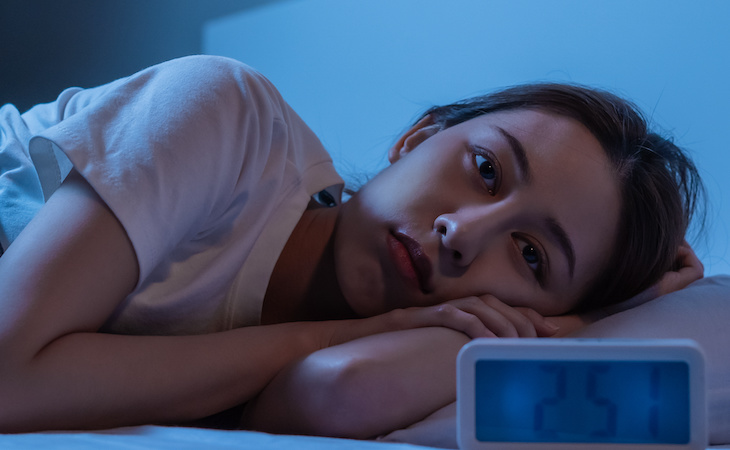When you don’t sleep well at night, you might wake up feeling even more tired than when you went to bed. You may even feel sleepy and out-of-sorts during the day and struggle to stay alert and productive.
In the long term, poor sleep may raise your risk of health conditions like heart disease, depression, and type 2 diabetes. Yet many people—about one-third of adults in the United States, in fact—still don’t get enough sleep.
Oftentimes, people don’t get enough shuteye because they struggle to fall asleep in the first place, even when exhausted. A common reason why this happens is due to having racing and overwhelming thoughts at bedtime.
If you can relate to this experience, then read on to learn ways to calm your mind before bed.
What causes a racing mind before bed?
“Racing thoughts often happen as we are trying to go to sleep,” says Amanda Marks, an Atlanta-based therapist and yoga teacher specializing in anxiety. Whether or not these thoughts are worries or positive, they can be overwhelming so much that getting much-needed shuteye in bed starts to feel like a dream.
“A racing mind before bedtime can be triggered by stress, anxiety, worries, caffeine, alcohol, mental health issues, or certain medications,” explains Shelby Harris, PsyD, director of sleep health at Sleepopolis. “When preparing for sleep, our minds are less occupied, allowing underlying concerns and stressors to surface, making it difficult to fall asleep calmly.”
Marks adds that the busyness of the day allows us to distract ourselves from or avoid our thoughts. So when it’s time to go to bed, and our environment is quiet, the thoughts—including our stressors and worries—come rushing back to us as we try to sleep, she explains.
Watch this video for tips on how to put together a relaxing bedtime routine:
How to calm a racing mind before bed
Whatever the reason why you have a racing mind before bedtime, you might be unable to sleep because you haven’t found a way to calm your mind, stay in the present, relax, and allow yourself to drift into sleep, says Mary Ann Covey, PhD, a licensed psychologist with Thriveworks in College Station, Texas.
Here are some expert and research-backed tips for calming a racing mind before bed.
1. Practice relaxation exercises
Don’t force it when you can’t sleep because your mind is racing, advises Harris. “If your mind is racing, use relaxation techniques like deep breathing or meditation to help you relax.”
Deep breathing, for example, has been shown to help with managing anxiety, relaxing the body, falling asleep faster, and experiencing better sleep.
Meditation is another mind-body exercise that can quieten the mind by bringing awareness to the present with curiosity and without judgment. Evidence suggests it may improve insomnia symptoms and sleep quality.
You can find deep breathing and meditation exercises on mindfulness apps like Calm and Headspace. You can also do the 4‐7‐8 breathing exercise. It involves breathing in for four seconds, holding your breath for seven seconds, and breathing out for eight seconds.
Other helpful relaxation exercises, according to Marks, include some gentle yoga poses such as legs up the wall or constructive rest. “Both activate the parasympathetic nervous system, which lets our bodies start to rest and relax,” she notes.
2. Create a bedtime routine
Creating a consistent bedtime routine that signals your body that it’s time to sleep is critical to help quiet a racing mind, says Covey. “If you are aware that your mind races before bed, create a routine that involves techniques that are calming and allow your mind to rest,” she suggests.
Aside from relaxation exercises such as meditation and deep breathing in your nightly routine, you can also add taking a warm bath, changing into comfortable sleepwear, and listening to relaxing music to your nightly routine.
3. Keep a journal
Keeping a journal, whether a gratitude, worry, expressive, creative, or reflective journal, is one of the best ways to release what’s on your mind so you can fall asleep.
Writing your thoughts and worries in a journal before you go to bed can help you let go of some of the persistent thoughts that keep you awake, explains Covey.
Studies also suggest that bedtime writing, whether that involves writing about your worries, what you achieved during the day, or the next day’s to-do list, may help you fall asleep more easily.
Also, if you’re religious or like to pray, Covey suggests adding a few intentions to let your mind stay calm and focus on what to be grateful for from the past day in your prayers.
4. Make your bedroom conducive to sleep
Harris recommends creating a comfortable sleep environment to help you relax and fall asleep at nighttime.
A comfortable sleep environment is cool, dark, quiet, and clutter-free. You can keep yourself cool in your room by sleeping on a breathable mattress and bedding, wearing light clothing to bed, and getting a cooling fan or an air conditioner when it’s hot.
Close your windows, use room-darkening shades, and turn off all lights and screens. You can also get an eye mask if you can’t keep your room pitch-dark.
Noise can also distract you from sleeping. If you live in a busy neighborhood, then you can get earplugs to block out any noise.
5. Avoid caffeine and alcohol
Alcohol and caffeine may trigger a racing mind at nighttime, according to Harris. So, she advises avoiding caffeine and alcohol if you find yourself with thoughts that keep you awake when you should be asleep.
Caffeine, whether in coffee, tea, or energy drinks, can affect how easily you fall asleep and how well you sleep. If you enjoy taking caffeine, then it’s best to have it in the morning and early afternoon hours and avoid taking it up six hours before bedtime.
Although drinking alcohol at nighttime might help you fall asleep, evidence suggests it may disturb your sleep and reduce overall sleep quality. Avoid reaching for a glass of wine or other alcohol when you can’t fall asleep.
6. Use your senses to help you relax
Use as many senses as possible to create an image that helps you relax and keeps your mind from racing, recommends Covey. “Many people use a beach scene where they picture a favorite beach that they have been to or seen in a movie,” she says.
Here’s how you can use your senses to help your body feel relaxed and fall asleep, according to Covey:
- Create the visual. Ask yourself what the beach looks like and answer in your head with as many details as you can come up with.
- Create the feeling. Imagine the sun beating on you, the sand between your toes, etc.
- Create the smells. Try to smell the salt water, the sunscreen, etc.
The more you focus on the details of your imagination, the less your mind races, says Covey.
When to seek professional help
If you’re having trouble sleeping or relaxing before bed—three or more nights a week—then talk to your doctor or a sleep specialist, Harris advises. They can discuss treatment options to help you calm your mind before bedtime and get better sleep.
Covey also recommends seeing a doctor if you still struggle to fall asleep for a significant amount of time, even after following different healthy sleep routines—or if it takes more than an hour to fall asleep and you wake up groggy.
After your doctor evaluates your sleep hygiene, they may refer you to a sleep specialist if they feel that would be best for you, she says.
FAQs
Why do I have racing thoughts before sleeping?
You may have racing thoughts before sleep because being in bed allows you to have all the thoughts you might have been too busy to have during the day. Mental health conditions like anxiety, caffeine, and worries may also trigger racing thoughts before bed.
How do I stop racing thoughts at night?
You can stop racing thoughts at night by practicing relaxation exercises like yoga and deep breathing, making your bedroom a sleep haven, engaging in a relaxing bedtime routine, and distracting yourself from your thoughts by visualizing a calming experience.
For more ideas on putting together a relaxing bedtime routine, check out our list of the top 10 nighttime activities to help you relax.






